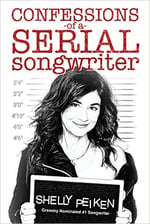How to Write a Hit Song
by Shelly Peiken
I WISH I knew. If I had the answer I would have written a whole lot more. Anybody who tells you there’s a formula...like always have the title in the first line of the hook or always get to the chorus in thirty-seven seconds, is probably describing a winning scenario that works sometimes, but I assure you, no formula will work every time. As for me, as soon as I think I’ve found the perfect cocktail, somebody hides my vodka. Having said that...I have picked up some songwriting tips from partners and colleagues that have resonated with me over the years. Such as...
• Stay True —I was on a songwriting panel with Kara (“American Idol”) DioGuardi, and she said something that was quite matter-of-fact. Let me Karaphrase: “If it doesn’t feel inspired going in, it won’t feel inspired coming out.” Sometimes the simplest ideas go under-appreciated. How many times have I been complicit in finishing a song I wasn’t “feeling,” so as not to be the stick-in-the-mud or disappoint my co-writer? The answer is: a lot more than I’d like to admit. Even though sometimes those songs manage to get recorded, more often than not, they don’t, and then I fail with something I didn’t believe in in the first place.
-
Walk Away —When you’re stuck...take a walk! This can be more visually stimulating in a city; however, there are other ways to clear your head. Here in L.A., we drive to a place where we can walk. Or we sit by a pool; there are so many pools.
-
Separate —Dan James, Leah Haywood and I had bits and pieces of a puzzle that we just couldn’t seem to put together. Dan left the studio for a coffee and a smoke and as soon as he came back in, he spewed a whole hook. Just like that—as effortless as a fart. After all that constipation, Leah and I looked at each other—WTF, Dan? And... did somebody get that? Songwriter Michelle Lewis excuses herself to “powder her nose.” She always comes back with a clever line; I know it has nothing to do with her nose. She just needs a little space.
-
Double Down —When I first worked with Albert Hammond, Sr., he suggested using the same exact line back to back. I said, “Albert...Umm...you just used that line.” And he said, “So what? Did it feel good?” It did. He said, “ Then don’t worry.”
-
Be Ready —Though your mobile device with its Voice Memo App is most likely by your side 24/7, sometimes it’s just nice to feel a pen glide around on paper. So keep a pad of Post-it notes on the piano, under your pillow, in your closet, in your sock drawer, in the spice cabinet, by your toothbrush, the kitchen sink, in your man-purse, the glove compartment, the bathroom, your gym locker—you get the idea— because you never know when an idea is going to tap you on the shoulder. You can swear you’ll remember it, but you won’t.
-
Work It Out —Get that blood closer to your brain. Good things happen when your heart beats faster.
-
Leave Room to Pace— Get out from behind the computer. Staring at a screen can hold you hostage. Release yourself. Your mind is freer when it’s not confined.
-
Keep Going—even when you feel like you’re filling up pages with meaningless gibberish. Often the golden nugget turns up at the very end of the last page of the stuff you thought was nonsense.
-
Be Disciplined —Sit at the piano or with that guitar every morning and noodle... even if nothing comes. Eventually something will.
-
Word Games —Crossword puzzles let you practice fitting words into limited or specific spaces...twisting and turning concepts around until some- thing clicks—like writing lyrics. Sometimes, just when you’re certain you can go no further, the next day you’ll be crossing the street and voilà...23 Across (or that missing line) becomes obvious. Your brain is working, even when you’re not.
-
Listen —Keep your ears open for snippets of conversation that catch your attention—a slur from a drunk in the checkout line, a blurb about the weather on the news, a lament from a tired two-year-old. We hear things selectively for a reason.
-
Rhyming— Soft rhymes or sound-alikes are pleasing. They have texture. They are fresh. Exact rhymes can sound stale. A perfect rhyme that’s “ball- park” is not nearly as interesting as a scrappy one that tells the truth.
-
The More the Merrier— If you can’t sing, consider writing with someone who can, especially if you are aiming to pitch the song to an artist with a big voice. A singer with range can take you to melodic places you wouldn’t have ventured yourself, simply because...you can’t sing!
-
Access Your Madness —Even the most mentally healthy songwriter harbors a bit of emotional dysfunction. This is no time to be sensible. Unleash it. It will serve you well.
-
Dream It —When you’re searching for an elusive word or an alternative melodic shape, concentrate on it when you go to bed. What we fall asleep thinking about is often what we dream about. If it comes to you in your sleep, document it as soon as you wake up, because we forget 90% of our dreams within ten minutes of waking. It’s been said that the introduction to “Satisfaction” came to Keith Richards in a dream. Makes me want to take a nap. Yawn.
-
Set the Mood —If you want a song to have a certain melancholy feel, listen to another song that has a similar melancholy feel, while you’re working on the new song. I’m not suggesting you rip it off...but use it like Viagra, if you will, to get in the mood. (If you remain inspired for more than four hours, be sure to get medical help right away.)
-
Keep Perspective— I’m uncomfortable when a co-writer automatically defers to me. He might think I know better just because I once wrote a big hit. I don’t. Conversely, sometimes I’m writing with someone who just had a hit and I start thinking maybe she knows better. She doesn’t.
-
Stay Clear —A lot of great songs have been written under the influence, but be careful. While being high may open your mind and let you see things in a different light, sometimes that heady mist of open-mindedness makes it hard to tell whether you’re really brilliant or just imagining you are.
My apologies to everyone who saw the title of this chapter and thought by reading it they’d know how to write a hit song. It’s just not that simple. If I had to come up with one X factor that I could cite as a characteristic most hit songs have in common (and this excludes hit songs that are put forth by an already well-oiled machine...that is, a recording artist who has so much notoriety and momentum that just about anything he or she releases, as long as it’s “pretty good,” will have a decent shot at succeeding), I would say it would be:
A universal sentiment in a unique frame.

Shelly Peiken is a Hit songwriter who is best known for writing #1 hits "What A Girl Wants" and "Come On Over Baby (All I Want Is You)" by Christina Aguilera, #1 hit "Bitch" by Meredith Brooks, and the Top 20 hit "Almost Doesn't Count" by Brandy. She has also written songs that were recorded by some of the biggest names in music: Celine Dion, Britney Spears, Gladys Knight, Cher, Gloria Gaynor, Samantha Fox, Taylor Dayne, Natalie Cole and many more. She wrote the book "Confessions of a Serial Songwriter” published by BackBeat Books, available on Amazon and at Bookstores near you.
To enter the 21st Annual USA Songwriting Competition, go to: http://www.songwriting.net


